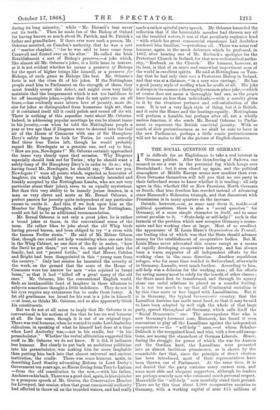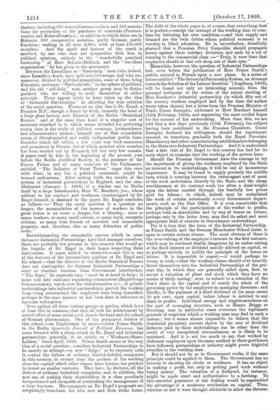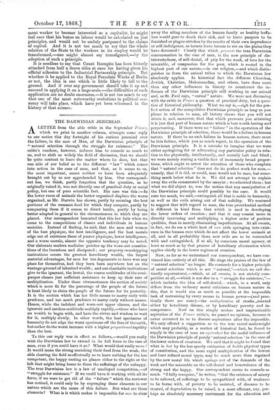THE SOCIAL QUESTION IN GERMANY.
1 T is difficult for an Englishman to take a real interest in I German politics. After the thunderclap of Sadowa, one seemed to see a rent in the perennial fog which hangs over Deutschland ; but it soon closed up again, and the political atmosphere of Middle Europe seems now murkier than ever. Even Germans themselves will tell you that no one party in their fatherland seems to know whither it is tending ; all only agree in this, whether Old or New Prussians, North Germans or South, that true freedom has receded instead of advancing since Bismarck's Bohemian triumph, and that discontent with Prussia.nism is in many quarters on the increase.
Outside, however,—or, as some may deem it, inside,—of political questions, there is also a "social question" for Germany, of a more simple character in itself, and to some extent peculiar to it. "State-help or self-help f" such is the formula of the problem which now occupies Germany's econo- mists and her working class at large. Most of us recollect the appearance of M. Louis Blanc's Organisation du Travail, one leading idea of which was that the State should advance money for the establishment of co-operative bodies. But M. Louis Blanc never advocated this course except as a means of rapidly developing co-operative industry, and has always been a warm supporter of all independent efforts by the working class in the same direction. Another republican refugee, who for some time resided in Switzerland, afterwards in Germany, Lassalle, went much further. According to him, self-help was a delusion for the working man ; all his efforts for saving money must be solely for the benefit of other classes ; the State must first be transformed, and through its agency alone can social relations be placed on a sounder footing. It is not too much to say that all Continental socialism is by this time more or less tinged with Lassallianism. But it is in Germany, the typical bureaucratic country, that the Lassallian doctrine has made most head, so that it may be said to have been adopted by well nigh the whole of that large party, spread throughout all Germany, which calls itself the "Social Democratic" one. The unscrupulous Slav who is now Germany's foremost man, Bismarck, has found it even convenient to play off the Lassallians against the independent co-operators — the " self-help " men,—of whom Schulze- Delitzch is the recognized head, and who, with a few odd excep- tions, are among the staunchest of German Liberals. Hence, during the struggle for power of which the war for Austria cut the Gordian knot, the Lassallians were promoted into an almost factitious prominence, as is shown by the remarkable fact that, since the principle of direct election has been introduced, most of their representatives have been thrown out of Parliament. At the same time, it is not denied that the party contains many earnest men, and some most able and eloquent supporters, although its leaders are perhaps scarcely men who command much personal respect. Meanwhile the " self-help " men manfully stand their ground. There are by this time about 1,900 co-operative societies in Germany, with a working capital of near 155 millions of
thalers; including 316 stores (Consumvereine), and 196 associa- tions for production or the purchase of materials (Product- vereine and Rohstoffveseine) ; in addition to which there are in Bohemia 109 co-operative societies, partly German, partly Czechian ; making in all over 2,000, with at least 250,000 members. And the merit and honour of the result is ascribed, by one who does not sympathize With him in political opinions, entirely to the "wonderfully practical leadership" of Herr Schulze-Delitsch, and the "excellent organization" he has given to the movement. •
Between the Lassallians or " State-help " men (who indeed, since Lassalle's death, have split into two camps, and who are, moreover, divided by political sympathies, some of them being Unionists, and some " Particularists "in the sphere of politics), and the old " self-help " men, another group may be distin- guished, who are willing to avail themselves of either principle. These appear lately to have taken up the idea of "Industrial Partnerships" as affording the true solution of the social question. Foremost on this line is Dr. Engel, a Prussian M.P., though a Saxon by birth, formerly the head of a large glass factory, now Director of the Berlin "Statistical Bureau," and at the same time head of a singular sort of seminary attached to it, which seems intended for perfecting young men in the study of political economy, jurisprudence, and administrative science ; himself one of that remarkable group of liberal-minded and really independent public func- tionaries which till within a few years was both numerous and prominent in Prussia, but of which member after member has been weeded out by Bismarck till but very few remain. A paper read by him in the beginning of the present year before the Berlin Juridical Society, in the presence of the Crown Prince and of many members of the Parliament, entitled "The Industry of Great Towns," urges this view with what, in any but a political economist, might be termed enthusiasm. After setting forth the results of the system of industrial partnerships in England, and the esta- blishment (January 1, 1868) of a similar one in Berlin itself by a large brassfounder, Herr W. Borchert, jun., whose address to his employe's and workmen, countersigned by Dr. Engel himself, is annexed to the paper, Dr. Engel concludes as follows :—" Thus the social question is a question no longer, the accumulation of the masses of workers in the great towns is no more a danger, but a blessing ; since so many workers, so many small owners, so many loyal, energetic citizens, so many true friends of movable and immovable property, and, therefore, also so many defenders of public order."
Notwithstanding the remarkable success which in some instances Industrial Partnerships have had amongst ourselves, there are probably few persons in this country who would go the lengths of Dr. Engel in their hopes respecting these institutions. It must, indeed, be observed,—and this is one of the features of the intermediate position of Dr. ngel and his school,—that the director of the Berlin Statistical Bureau does not contemplate for German Industrial Partnerships a state of absolute freedom from Government interference. "The State," he expressly says, "must be at hand to help ; it must call into existence regulating commissions (Regulirungs Commissionen), watch over the transformation (i.e., of private undertakings into industrial partnerships), protect the workers from being overreached, the employers from being damnified, perhaps in the same manner as has been done in reference to agrarian redemption."
Over against all these various groups or parties, which have at least this in common, that they all seek the achievement by united effort of some social good, stands the hard and dry school of German plutonomists. One of the prominent leaders of this school.—an Englishman by name,—John Prince Smith, in the Berlin Quarterly Journal of Political Economy, has come forward with a sharp attack on Dr. Engel and industrial partnerships generally, in an article on "Workmen-Share- holders," dated April, 1868. Prince Smith sneers at the very idea of a social question ; considers Industrial Partnerships to be merely an attempt,—a new "dodge," as he expressly calls it,—after the failure of ordinary limited-liability companies in this country, to extract from the pockets of the working class the capital which other classes have become too prudent to invest on similar ventures. They have, he declares, all the defects of ordinary industrial companies, and, in addition, the new one of seeking their shareholders in a class peculiarly inexperienced and incapable of overlooking the management of a large business. His comments on Dr. Engel's proposals are unsparingly trenchant, his hits now and then strike home.
The drift of the whole paper is, of course, that everything that' is is perfect,—except the attempt of the working man to com- bine for bettering his own condition,—and that supply and demand are the twin deities whom political economy is to worship in blind adoration. He is, nevertheless, dreadfully alarmed that a Prussian Privy Councillor should propagate
heresy against these tutelary divinities, and ends by a cry of warning to the commercial class :—" Truly, it were time that employers should at last rub sleep out of their eyes."
Meanwhile, however, the question of Industrial Partnerships had, even before the publication of Herr Prince Smith's article, entered in Prussia upon a new phase. In a series of letters entitled "The Industrial Partnership System, an Attempt towards the Solution of the Labour Question" (Augsburg, 1868), will be found not only an interesting account, from the personal testimony of the writer, of the actual starting of Herr Borchert's industrial partnership (in which fifty out of the seventy workers employed had by the time the author wrote taken shares), but a letter from the Prussian Minister of Trade, Count Itzenpitz, addressed to Herr Borchert himself (18th February, 1868), and expressing the most cordial hopes for the success of his undertaking. More than this, we are told that a few days previously (15th February), the subject having been mentioned in the Prussian Chambers, Count Itzenpitz declared his willingness, should the experiment succeed, to transform gradually both the Royal Porcelain Manufactory and other manufacturing establishments belonging to the State into Industrial Partnerships. And it is understood that a late visit of Dr. Engel to this country has had for its main object to examine into the working of the system here.
Should the Prussian Government have the courage to try the experiment of giving the workmen employed by the State an interest in its undertakings, it will be one of momentous importance. It may be found to supply precisely the middle term which is wanting between the extravagant cost of most of the work undertaken directly by the State, and the cheap worthlessness of its contract work, too often a dead-weight upon the labour market through the fearfully low prices paid for labour ; to which, indeed, may be assimilated
the work of certain notoriously screwy Government depart- ments, such as the Post Office. It is even conceivable that
the principle of the participation of the worker in profits, perhaps both as shareholder and by way of bonus on labour, perhaps only in the latter form, may find its safest and most appropriate field of exercise in Government undertakings.
For it is true that the form of the Industrial Partnership, as Prince Smith and the German Manchester School insist, is open to certain serious abuses. The most obvious of these is the over-valuing of the employer's interest in the first instance, which may be rendered doubly dangerous by an undue raising of the fixed interest or dividend usually allowed on capital, so as perhaps entirely to nullify the principle of the bonus on labour. It is impossible to expect,—it would perhaps be wrong to wish,—that the working classes should ever heartily throw themselves into the Industrial Partnerships of the pre- sent day, in which they are generally called upon, first, to accept a valuation of plant and stock which they have no means of fairly testing ; next, to submit to a retention of the lion's share in the capital and of nearly the whole of the governing power by the employers as managing directors ; and thirdly, to le payment of a fixed dividend of (in some cases) 10 per cent. upon capital, before labour is entitled to any share in profits. Individual energy and singleheartedness on the part of managing directors, such as Messrs. Briggs or Greening, may in particular cases overcome the legitimate grounds of suspicion which a working man may find in such a system ; but it seems almost impossible to believe that the wonderful pecuniary success shown by the rate of dividend hitherto paid by these undertakings can be other than the result of very exceptional circumstances, or is likely to be sustained. And it is not too much to say, that worked by dishonest employers upon the same method as these gentlemen have followed, partnerships of industry might prove frightful swindles to the working man. But it should not be so in Government works, if the same principle could be applied to them. The Government has no interest in cheating its clerks or workmen. It has no object in making a profit, but only in getting good work without losing money. The valuation of a dockyard, for instance,
might be made exact and authoritative to a farthing. To this essential guarantee of fair dealing would be superadded the advantage of a moderate retribution on capital. Thus, whether or not it were thought advisable to allow the Govern- raent worker to become interested as a capitalist, he might feel sure that his bonus on labour would be calculated on just principles, and would not be unduly postponed to the claims -of capital. And it is not too much to say that the whole relation of the State to the workers in its employ would be transformed,—one might almost say transfigured,—by the -adoption of such a principle.
It is needless to say that Count Itzenpitz has been bitterly -attacked from half a dozen sides at once for having given his .official adhesion to the Industrial Partnership principle. But whether it be applied to the Royal Porcelain Works of Berlin -or not, the idea is one which is little likely to fall to the ground. And if ever any government should take it up and :succeed in applying it on a large scale,—the difficulties of such application are no doubt enormous,—it is not too much to say that one of the most noteworthy evolutions in political eco- -nomy will take place, which have yet been witnessed in the history of that science.




































 Previous page
Previous page